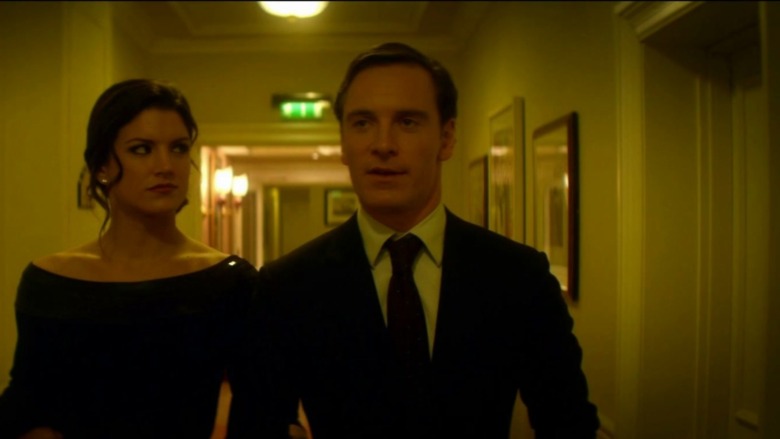The Ending Of Haywire Explained
Director Steven Soderbergh has proven time and time again that he's a master of the craft regardless of what genre he's operating in. From pulling off thrilling heist capers in the "Ocean's Eleven" trilogy to making one of the most relevant movies in the modern era with the thriller "Contagion," he always understands the assignment. It was only a matter of time until he could prove he could choreograph a fight sequence with the best of them thanks to 2011's "Haywire."
The film follows a highly trained security contractor, Mallory Kane (Gina Carano), who's betrayed by someone on her own team after she successfully frees a hostage. She needs to uncover who carried out the double-cross, and fortunately, she has years of black-ops training to allow her to smoke out her true adversary. Carano's joined by a stellar cast, including the likes of Ewan McGregor, Michael Fassbender, Channing Tatum, Antonio Banderas, and Bill Paxton.
In true Soderbergh fashion, the film is filled with twists and turns with ample doses of brutal fisticuffs. It's 92 minutes of pure adrenaline-pumping action directed with the care of a true auteur, but if the "Haywire" ending left you a bit befuddled, then allow us to bring this dark ops tale into the light.
Haywire ends with Mallory learning of her setup
Throughout "Haywire," various men attempt to kill Mallory for seemingly unknown reasons, forcing her to set up on a globe-trotting journey to figure out how she can get out of the game for good. This results in a tense confrontation on the beach with Kenneth (McGregor) revealing that the journalist she saved initially had information linking Studer (Mathieu Kassovitz) to a human trafficking operation. She inadvertently led the journalist to Studer, who killed him, but she was framed with the murder after it came out she planned on leaving the private intelligence firm she used to be a part of.
This information is conveyed via flashback, where we see all the machinations fall into place before we're transported back into the present. It all ends with Mallory tracking down the last man who betrayed her, Rodrigo (Banderas), obviously prepared to kill him so that she can move on.
Without the context provided in the ending, "Haywire" comes across as a textbook thriller. There's a lot of talk of double-crosses and characters asking, "Who set me up?" In the end, it all relates to the beginning as we learn that the journalist Mallory saved at the beginning ties into everything, and that single mission is the reason why she's had to fight for her life throughout the movie. The "Haywire" ending is par the course for Soderbergh's films, which often include flashbacks to illuminate more confusing aspects of the plot we've seen previously. "Ocean's Eleven" ends with scenes depicting how the team pulled off the heist while "Contagion" ends with a flashback sequence showing how the virus that kicked off the pandemic in the first place came to be transmitted to Patient Zero. Once again, Soderbergh has proven his mastery of story structure.
The political undertones to the ending of Haywire
"Haywire" may come across as a straightforward action-thriller with fight scenes that would give "John Wick" a run for its money, but looking more closely, it's hard not to see it as a political allegory for how men in power view women.
Aside from a few minor characters, Mallory Kane is really the only woman in the film. She's exclusively hunted down by men, and during one of the final scenes, we see how it's only men discussing what to do with it after it's announced she plans on leaving the firm. What you see is a bunch of males deciding her fate without even bothering to bring her into the conversation at all. She's talked about in length and her fate is ultimately decided by other people, but she's left out of the conversation entirely. Through a political lens, it's hard not to look at the scene as an allegory for women's healthcare and how predominantly male politicians are the ones deciding what women can have access to.
In real life, women are often stripped of agency, with men attempting to control every aspect of their existence. With this in mind, it's easy to look at "Haywire" as a commentary on how one woman rebels against the patriarchy so that she can carry on with life on her own terms. By the end of the film, she's dispatched all the men from her previous life and has cleared her name. Life is wide open to her from here on out, whether she accepts that job offer from the CIA or goes down a completely different path.


